I picked this one up because I was interested in the journalism aspect of the story; it's simply coincidence that I'm posting my review during Asian-Pacific American Heritage Month.
In the aftermath of her father's death in a hit-and-run accident, Maggie Chen is helping her mother sort through his things when she starts uncovering startling inconsistencies. His old prep school and fraternity claim they've never heard of him. His notebooks have cryptic messages scribbled in the margins. An aspiring journalist, taking after her father, Maggie vows to delve deeper into the mystery. What she doesn't expect is to stumble upon a major criminal story in the course of her work as a newspaper intern that might just connect to her father's mysteries. But is it simply that her father was onto the same story? Or was the man lying about more than just his origins?
But this isn't just the story of Maggie and her father - this is also the story of Fai-yi Li, a 19th century Chinese immigrant whose story also plays a role in Maggie's life. As his story slowly unfolds, Maggie digs deeper into her father's past, until the stories intersect.
I like to think that I'm fairly well versed in history, but then I stumble across stories like this and I realize just how much there is that I don't know. I know that Chinese immigrants weren't treated well in the 19th century (because Americans really didn't treat any immigrants well at that point), but I didn't know about the Chinese Exclusion Act, which suspended legal Chinese immigration into the US for decades. The Act gave rise to "Paper Sons," Chinese immigrants who were allowed into the country because a Chinese-American citizen would claim the immigrant as a son (or daughter). Want more information on Asian immigration in this era? My friend Ay-leen the Peacemaker not only has a badass name, but runs the awesome steampunk project Beyond Victoriana and this past week's post was all about Asians in the Americas. (While the general focus of Beyond Victoriana is multi-cultural steampunk, many of Ay-leen's essays provide historical background for non-western cultures in the Victorian-ish era that are fascinating even outside of a steampunk context, hence the link this week)
I found the historical chapters to be a bit of a drag, and once Maggie starts researching the history of Chinese immigrants in Seattle the characters can get a little preachy - it's clear that Ingold did a lot of research and I'm sure it was insanely difficult for her to decide what there was room for in the story and what wasn't. The information she does include is fascinating, but I feel it doesn't roll out smoothly. But the journalistic thriller aspect of the story, as Maggie helps track down leads both about corruption in city hall and her father's secretive past, is fast paced and well done.
This is also an interesting novel on the immigrant experience, in part because that isn't the focus of the story. Many, many stories featuring non-white protagonists are about how the character doesn't fit in to mainstream America society and how different she or he is, but Maggie tells a fellow intern at one point that she doesn't necessarily think of herself as "ethnic" - she is aware of and proud of her Chinese heritage, but her family has been in the US basically "forever" so her primary identity is American. It is through the historical chapters with Fai-yi Li that we see what immigration was like for the Chinese on the Pacific coast.
On a closing note, continuing with my goal to not only shame publishers that white wash covers but to applaud those who accurately portray people of color, Harcourt wins for giving us an unambiguous Chinese model on the cover:

2 comments:
This is the first review I've seen of Paper Daughter so far so thank you.
I couldn't tell if this was historical/realistic or all historical or all realistic. I don't mind books that are both and I'm a history buff so I don't usually mind too many historical details. I'm very curious about the mystery, it's very vague. Also I want to read a YA book that is not all about romance.
Yeah, I'm ahead of the bandwagon for once! ;-)
It's mostly a contemporary book - the chapters don't alternate between Maggie and Fai-Yi, it's more like 70% contemporary, 30% historical. I'm terrible at mysteries, so that's why I purposefully left my description of it vague so that I wouldn't give away too many details and thus spoil it for someone who's really good at figuring them out.
I'm also ready for more YA books that are less about romance, more about story. I just read a SF dystopian story where the romance was shoehorned in in a terrible way. The only romance in this is Fai-Yi falling for a Chinese-American woman, but we're told far more about that relationship than we're ever shown, so it hardly counts as a romantic subplot.
Post a Comment